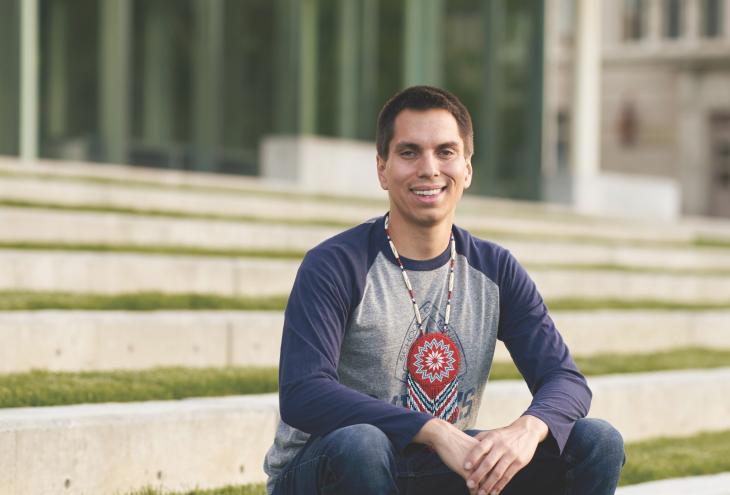Like many other Native students, Kenny Swift Bird was motivated to go to college. He had some great teachers at the high school in his small Nebraska hometown of Chadron, less than an hour’s drive from his Oglala Lakota Tribe’s Pine Ridge Reservation in South Dakota. When he took statistics, calculus, and chemistry, his teachers helped him discover both his aptitude for STEM and how much he enjoys it.
At home, Swift Bird’s mother — a teacher herself — always stressed the importance of education. His grandmother, too, was a constant source of inspiration, pushing him to apply for scholarships and to continue his education at the graduate level. He took her advice, applied for many scholarships, and was fortunate to be selected as a Gates Millennium Scholar (class of 2012) — alleviating the financial burden of his undergraduate and graduate studies.
But once he got to college, one of his biggest challenges was finding his passion. “It’s hard to know exactly what you want to do with your life at 18 or 19 years old,” Swift Bird says, and he made a false start in a mechanical engineering major. “I struggled to make grades and nearly failed out of college,” he recalls. “Then I decided to take an introductory geology course on a whim, and it immediately clicked. Thankfully, once I found my niche, I settled in and started to excel in most of my classes.”
As an undergraduate, a homegrown water problem piqued his interest in hydrology. “There’s a Lakota saying, ‘Mni Wiconi,’ or ‘water is life,’” Swift Bird says. “Water is sacred and one of our most basic needs, but many tribal communities lack clean, abundant water sources. Back home on the Pine Ridge Reservation, there are high levels of uranium and arsenic in soils and bedrock.”
Because the reservation is largely rural and many people rely on well water that may be contaminated, Swift Bird’s concerns are well-founded. As a master’s student, he was able to develop a project that bridged his academic interests with this real-world problem that affects people’s everyday lives. “Researching how contamination occurs in aquifers is a first step,” he explains. “Then we can move toward developing plans and treatment strategies to ensure people back home have access to safe drinking water.”
Swift Bird’s focus on that goal led to his current studies in contaminant hydrogeology, or how toxic substances like metals move through and concentrate in groundwater aquifers. His master’s thesis is based on understanding controls of uranium and arsenic contamination in groundwater on the Pine Ridge Reservation.
Throughout his studies, he says everyone at the Colorado School of Mines, from his advisor to administrators and other students, has been supportive of him as a Native student. “Being here has been an incredible opportunity,” he says. “Beyond the academics, I’ve also been involved with several clubs, including AISES, as both an undergraduate and graduate student. I currently serve as a graduate student government representative.”
AISES, which Swift Bird joined in 2016, has been an important resource. “I’m currently in the Lighting the Pathway to Faculty Careers for Natives in STEM program. It’s been great to have an additional mentor for advice, feedback, and extra motivation,” he says. “I attended my first National Conference in 2017. There aren’t many other Indigenous students on campus, so it was refreshing and inspiring to meet so many other Native scholars from across the country who are doing incredible work.”
Swift Bird’s ultimate goal is to obtain a doctorate and become a professor. “I’d like to continue researching water-quality issues on reservations,” he says. “The Navajo, Pueblo, and Cheyenne River Sioux Tribes are just a few examples with reservations that also face serious problems from metals [in water].”
During Swift Bird’s lifetime alone, much of the world’s drinking-water resources will be significantly impacted by climate change, growing populations, and contamination. “Water is a sacred and often-overlooked resource. I want to dedicate my career to addressing these problems and helping ensure that people everywhere have access to safe drinking water,” he says, “particularly in marginalized communities such as tribal reservations.”














